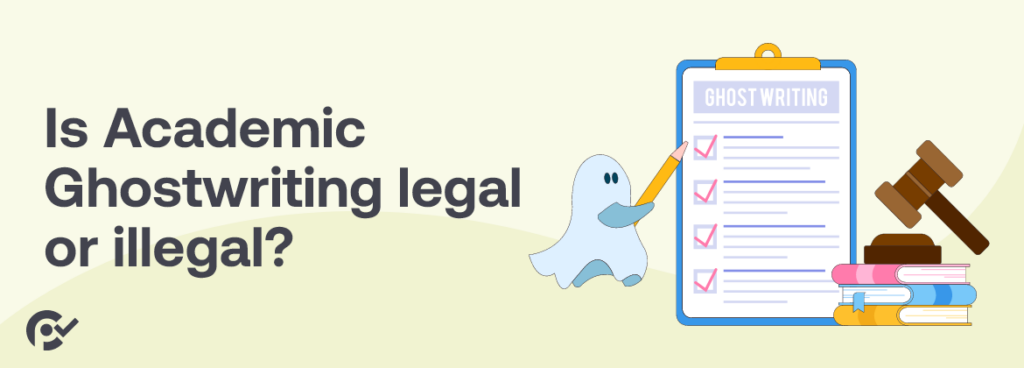
Is Academic Ghostwriting legal or illegal?
Academic writing is the type of writing that includes clear and concise information related to a given topic in a properly structured way for the ease of readers. You will see this type of writing in academic submissions and publications.
It is generally written in a formal way. Moreover, it also includes citations from different sources with proper references to make it easier for readers to access the referred sources and validate the included information in research papers and dissertations.
Things can get really difficult for students while doing academic writing. Failure to manage time properly, having no clue about their paper’s intro and logical conclusion and procrastination can be referred to as some issues they face during the process. In such a scenario they look for external aid to get the job done. This is where academic ghostwriting comes into the scene.
It is noted that the argument regarding the legitimacy of academic ghostwriting has augmented significantly in recent years. Some people consider it unethical as well. In this writing, we will try to settle this argument by reviewing the process of academic ghostwriting from different angles and sharing our opinion with our readers. If you are interested in the topic being discussed in this blog, then make sure you read it till the very end to learn more about it.
What is Academic Ghostwriting?
While it is the responsibility of the students, scholars, or researchers to write academic submissions and publications themselves, it is observed that some people often get aid from other parties for this purpose. For example, they can take the help of their supervisors, tutors, classmates, and seniors who have already worked on similar kinds of topics. Furthermore, some students also get assistance from professional academic writers. They hire professional academic writers to work on their submissions in return for a mutually agreed fee.
The writer who actually works on the academic submission or publication has no right to claim the authorship of the content. Hence, such a writer is called the ghostwriter, and this entire process is called academic ghostwriting. It should be noted that the person who has helped a scholar or student in doing research and writing a submission or publication will be known as a co-author and share the authorship rights. After that students check plagiarism using an online tool to avoid any inconvenience.
What are Some Pros and Cons of Academic Ghostwriting?
Here we will discuss a few pros and cons to help you understand the advantages and downsides of academic ghostwriting. Further details are given below:
Pros
There are some pros of academic ghostwriting that you need to understand before judging its legitimacy. Read on to know more.
- You don’t have to take time management stress or specify a particular time to write your work.
- The work will be done in time because you are likely to procrastinate when writing an academic submission yourself. On the other hand, the ghostwriter will take care of the deadline.
- You won’t have to spend a lot of time on the writing task; your job is to provide a title and a brief outline (if possible).
- You don’t need to determine the beginning or end point of your writing as the job of brainstorming about these elements is passed over to the ghostwriter.
- You won’t spend much time digging deep into the research sources to collect information to be cited in the academic work; it is the ghostwriter’s job.
Cons
While there are pros of ghostwriting, you can’t overlook this process’s cons. So here are some cons that you should be aware of.
- It goes without saying that academic ghostwriting is a costly process. You may have to pay several hundred dollars to get the job done.
- You still have to stay in touch with the ghostwriter to stay updated about the task’s progress and make the writer aware of changes in requirements.
- There is no surety about the quality of content. To ensure quality, you may have to edit and check the work for plagiarism through an efficient plagiarism checker.
- In case of a communication gap, you are likely to encounter more significant problems, such as deviation from the main topic and citations from sources that are irrelevant to the topic.
- If you have zero input in the writing process, some people may call you a cheat or liar if they come to know that a ghostwriter wrote the submission.
Is Academic Ghostwriting Legal?
Now coming to the conclusion of the blog, it is essential to know whether academic ghostwriting is legal or illegal. We can say that there are no legal repercussions in case your academic work is found to be written by a professional academic writer who consented to work as a ghostwriter in return for a mutually agreed fee. However, some people may consider it unethical. With that being said, it is essential to know that it can be regarded as academic dishonesty.
If you are found to be a beneficiary of academic ghostwriting, your supervisor or jury can reject your paper or dissertation. Furthermore, you can face expulsion from the institution as well. Therefore, it is necessary to ensure that you have hired the services of a ghostwriter who will not disclose your confidential data to anyone else. You must go through the whole research paper for proper defense against the jury and keep this entire saga a secret to avoid ethical implications.







